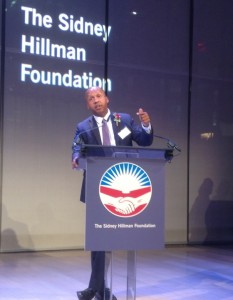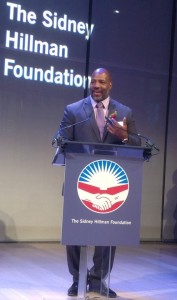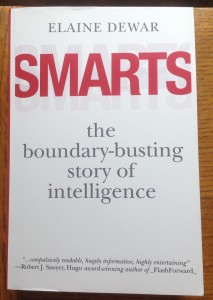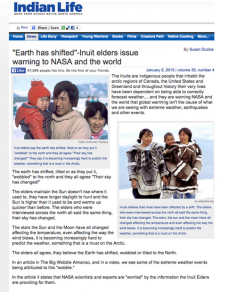Editing SMARTS Made Me Smarter; Reading it May Do the Same for You
/1 Comment/in Books & Writing, Technology, Science & Computers /by Philip TurnerExcited to note publication for all my readers here of a new nonfiction book I edited in manuscript, SMARTS: The Boundary-busting Story of Intelligence. It’s by the award-winning science writer and talented narrative journalist Elaine Dewar. A more expansive subtitle appears on the half-title page in the printed book the author just sent me:
Computing slime moulds, political primates, masterful plants, altruistic robots, amoeba machines, high IQ chips, philosophers of mind using screwdrivers,
signals, spies, the brilliant life and mysterious death of Alan Turing, and the boundary-busting story of intelligence.
An intellectually stimulating aspect of this edit was discovering that, in astonishing variety of ways, as Dewar writes, “the process of natural selection can lead to the evolution of adaptive behaviors.” I learned that these creative adaptations occur in even the most primitive life forms, such as the slime moulds referred to above. Even more startling are neural networks, a product of artificial intelligence, whose development Dewar chronicles.
“A neural network is a radically simplified computer version of the real thing. Real neurons build physical connections to neighbor neurons which link together in a network as they receive and send electrochemical signals back and forth. The more neuronal connections, and the greater the intensity of these interactions between neighbors, the stronger the information bond between them: thus, we learn. Neural network-style computation enables modern computers to learn by changing or weighting the frequency of interactions between one part of a network and another.”
Dewar earlier wrote BONES: Discovering the First Americans, on the ancient peopling of the Americas, and THE SECOND TREE: Clones, Chimeras and Quests for Immortality, a kind of nonfiction version of Margaret Atwood’s dystopian novel ORYX AND CRAKE. I published both those nonfiction books when I was with Carroll & Graf last decade, after they had been edited and published in Canada, where Dewar lives. Suffice to say, I relished the chance to finally edit one of her manuscripts!
While each of the earlier books dealt to a large extent with the human past, here Dewar—who in the course of writing SMARTS visited with and interviewed a dozen or more top thinkers, inventors, and scientists working in the Smart realm—synthesizes their work, boldly imagining where research and emerging technology may take intelligence in the years and decades to come.
SMARTS is published by a new company called Debonaire Books, and is available via this link in a quality paperback edition and as an ebook. I’m tickled to have a copy of the quality paperback, shown below, and especially excited that during a visit to Toronto later this month I’ll be attending a party to launch the book. Here’s what it looks like: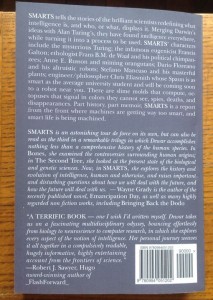
Sunday Afternoon in Upper Manhattan & along the Hudson Near the Great Gray Bridge
/0 Comments/in Bicycling, Personal History, Family, Friends, Education, Travels, Urban Life & New York City /by Philip TurnerI hadn’t pedaled up to the Great Gray Bridge for a couple months, and today turned out to be an ideal day for it. Blue sky, puffy clouds, abundant sunshine. Perfect. Click here to see all photos in this post.
Laird’s Applejack, an American Liquor Since 1698!
/1 Comment/in News, Politics, History & Media /by Philip TurnerFascinated to learn that Laird’s Applejack, a tasty liquor still available nowadays was made in the Americas beginning in 1698! In the fine print is also the info that around 1760 George Washington obtained the recipe and arranged to distill it for the imbibing citizens of Virginia. Producers of one of my fave TV shows, “Turn: Washington’s Spies,” could practically do product placement of Laird’s on their show! Please click on the headline above for a full post with pictures and a classic W.C. Fields comedy movie video clip.
New York City, a Veritable Dog Parade!
/0 Comments/in Nature, Animals, Adventure, Urban Life & New York City /by Philip TurnerPlease click headline for post & picture.
Only a Rare Radio Talent Could’ve Done What Vin Scelsa Did for 47 Years
/0 Comments/in Music, Bands & Radio, Personal History, Family, Friends, Education, Travels, Urban Life & New York City /by Philip TurnerPlease click headline for post & picture.
Inuit Elders Warning NASA: “The Earth has shifted, the sky has changed.”
/0 Comments/in Personal History, Family, Friends, Education, Travels, Science /by Philip TurnerTom Russell’s “The Rose of Roscrae,” a Rich Evocation Braiding Ireland & the American West
/0 Comments/in Music, Bands & Radio /by Philip TurnerThe renaissance man of Americana presents an ambitious folk opera set in the American west of the 1880s
A few weeks ago, this article in the Guardian caught my eye: Tom Russell: The Rose of Roscrae, A Ballad of the West review – a brave and original epic
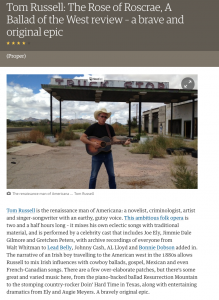
I’d seen country singer Tom Russell once, in the 90s at the old Rodeo Bar on Third Ave at 28th St. Last night I had the privilege of hearing him again at a Chelsea venue called Midtown Live, which is booking some great acts these days. These many years later, Russell—cowboy singer, songwriter, renaissance man of the modern West—was playing songs from his new folk opera, recently released in a two-disc CD, “The Rose of Roscrae,” a capacious 52-track assemblage that charts the life journey of a historical figure named Johnny Dutton—and Russell’s imaginative extension of the character, “Johnny Behind the Deuce.” Based on what I read in the book that accompanies the CD, at sixteen, in 1880, Dutton fled Ireland after his girlfriend’s father forbade his courting her. The incident prompts this stanza in the title song, after which Johnny heads for the American West,
Now I can feel her father’s fists/As he knocked me ‘cross the stable floor/And I left my blood and tears behind me/As I walked all night from Roscrae to Templemore
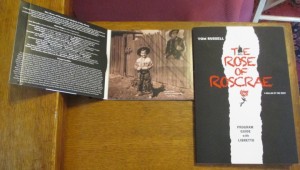 The Guardian piece has more details, and the video in the post below this one shows an actual rehearsal of “The Rose of Roscrae.” They make it quite a proper revue, with dance movements, fancy rope tricks, and multiple-part harmonies.
The Guardian piece has more details, and the video in the post below this one shows an actual rehearsal of “The Rose of Roscrae.” They make it quite a proper revue, with dance movements, fancy rope tricks, and multiple-part harmonies.
“The Rose of Roscrae” makes a fair bid to be an historical epic, sketched in the green hues of Ireland and the dusty tones of cowboy country, with great musicianship and vocals. I was really pleased to discover that apart from the many songs that Russell wrote—performed here with a large and illustrious ensemble—has also found much precious archival sound that fits the theme: decades-old songs performed by Lead Belly, Moses “Clear Rock” Platt, Johnny Cash, and Jack Hardy.There’s even scratchy sound of a near-contemporary of Walt Whitman reading the bard’s poem “America.” Russell shows his folklorist/song and sound collector side to great effect. Other songs include the voices of Ramblin’ Jack Elliott, Jimmie Dale Gilmore, Guy Clark, Ian Tyson, Eliza Gilkyson, and Bonnie Dobson. The package also includes an illuminating 82-page book with the libretto, bios of the players, and Russell’s notes on the songs, which I read late last night, long after the concert ended.
Readers of my blogs may recall my affinity for Marc Berger’s concept album “Ride,” a kind of cousin to this work by Russell. In 2013 I wrote about Berger’s work here. I’m sure both writers have been inspired by Edward Abbey, a kind of Beat figure of the mid-century American West. Relatedly, I see a connection to some great movies, 1) “Treasure of the Sierra Madre,” which I wrote about here; and 2) the 1962 Kirk Douglas film, “Lonely Are the Brave,” where he plays a latter day cowboy unable to live in or with modern society. It was based on Brave Cowboy, a novel by A.B. Guthrie, who of course wrote the great modern western The Big Sky, about mountain man Boone Caudill. Kirk Douglas also played the lead role in the 1952 adaptation of The Big Sky.

